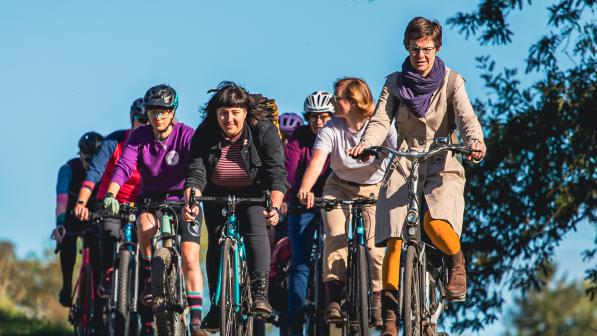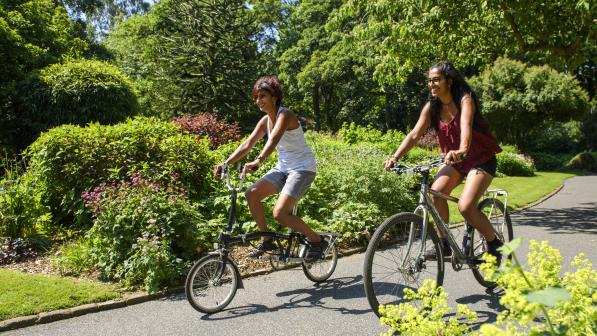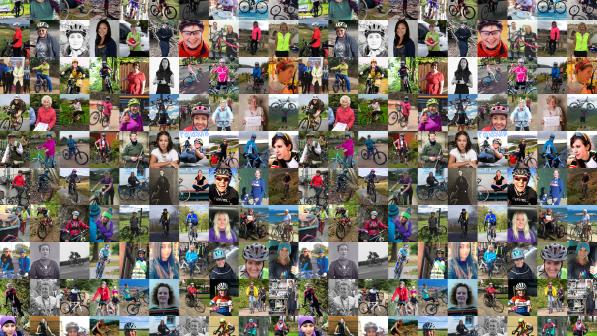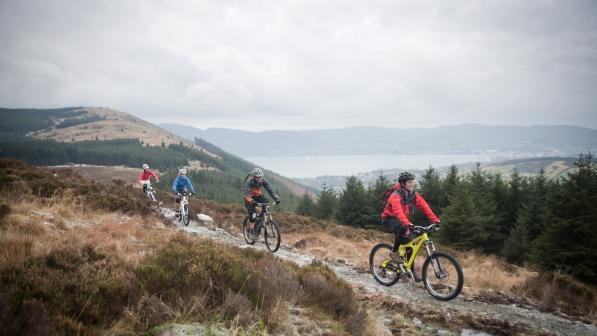‘Women Don’t Cycle’ on International Women’s Day

I had been particularly excited about this event, as it draws attention to the specific barriers women face when cycling, an issue which can be overlooked in the broader push for safer cycling infrastructure. It also marked an exciting collaboration between different organisations in Belfast engaged in efforts to improve the active travel infrastructure in the city.
The film had been suggested by a member of the activist group, the Belfast Cycle Campaign, and provided the perfect opportunity for Cycling UK and the Sustainability Team at Queen’s University Belfast to collaborate.

An inspiring journey
Brulard’s documentary tells the inspiring story of her 13,500 km cycle from Brussels to Tokyo. Accompanied by her partner Dries, their journey takes in countries truly diverse range of countries from German and Turkey, to Turkmenistan, Tajikstan and Iran, to name but a few. There is much to admire about this film. Manon is a cheerful, but honest guide throughout, faithfully chronicling the joys and challenges of the journey.
She presents a thoughtful, adventurous meditation on the possibilities of slow travel and the inherent empowerment of cycling. The scenery is spectacular as the pair cycle move through blistering deserts, lush farmland and over mountain ranges. I cannot be the only one who felt inspired to start planning a two-wheeled road trip! If not an 11-month trek across Europe and Asia, perhaps something a bit closer to home.
Women's cycling stories
But it's the stories of the women Brulard meets along the way which form the compelling spine of this film. She seeks out women on bikes in all the countries she travels through, resulting in an eclectic range of voices and conversations. For example, in Iraqi Kurdistan, she speaks with Nyan, a member of an all women cycling team who took gold at the Arab Cycling Championships. Or Emma, a bike courier in Budapest, who found strength and confidence through her work. Or the extraordinary Shima, who, alongside her husband and toddler son, spent 400 days cycling around Iran.
However, though the cultural contexts where often very different, it was interesting to see universal themes emerge from these stories and resonate with my experiences cycling in Belfast. There was an often-repeated desire amongst women to take up space and revel in the freedom of movement cycling provides.
Many of the interviewees also noted the tendency for cycling infrastructure to be built with the interests of male cyclists in mind, with less attention paid to the types of journeys favoured by women. And finally, there was a general commitment to organising and driving change in their local area. Despite the vast differences between us, I could not help but feel a sense of solidarity and shared purpose with the women on the screen.

Potential for cycling cities
Following the film, the audience was treated to a short panel discussion in which Dr. Agustina Martire (Queens University Belfast), Etain O’Kane (Belfast Cycle Campaign) and Gemma McNamara (Cycling Ulster) explored on their own experiences of cycling in Belfast and beyond.
Agustina, spoke about the potential of Belfast to become a great cycling city and the ways in which bold leadership was needed to build the infrastructure needed to move towards this vision. She reminded the audience that she does not identify as a ‘cyclist’, but simply as a person trying to move across the city, often with her daughter, on a bike. Her words were reminiscent of Zeynep, from Istanbul, who spoke in the film about her work with government officials to develop cycling infrastructure across the city.
Etain spoke about how the interview with Beatrix, an Austrian woman, really resonated with her. Beatrix began participating in critical mass cycle rides to highlight the lack of safe cycling infrastructure in her city. As the mother of two daughters, she wanted to create a safe, cycling city for her children to enjoy. Similarly, Etain had stopped cycling in Belfast as she found it unsafe but got back on the bike in order to cycle her son to school. Now, as part of the Belfast Cycle Campaign, Etain is pushing for change.
Gemma spoke about her love of off-road cycling and the need for more and better bike trails in Belfast and Northern Ireland more broadly. Like many of the women interviewed by Manon (and indeed Manon herself!), Gemma reminded us that women are not just urban cyclists, but engage is wide variety of cycling pursuits. The panel discussion provided a fitting way to round out an excellent evening.
To watch ‘Women Don’t Cycle’ or to host your own screening go to www.womendontcycle.com



